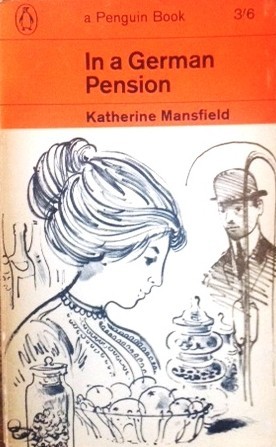Inspiring Older Readers
 posted on 20 Mar 2022
posted on 20 Mar 2022
In A German Pension by Katherine Mansfield
New Zealand author, Katherine Mansfield (1888–1923), is frequently cited as one of the twentieth century’s great short story writers. I’ve personally always thought that in many ways her real life was more interesting than anything she wrote. The way she chose to live, given the restrictive mores of her time, seems to me to be the very definition of bohemian. In a life cut ridiculously short by TB she moved as a teenager to London, had numerous affairs and marriages with men and women, was disinherited by her mother, spent time in Europe and began writing short stories, had an affair with Virginia Woolf and married the literary publisher Middleton Murry.
Throughout all of this she honed her writing skills as her health started to seriously deteriorate and by the time of the publication of her third collection – The Garden Party – she was gaining the sort of recognition that has continued to grow since her death. Murry effectively became her literary (and reputational) executor and oversaw the publication of the outstanding stories that had not seen the light of day during her lifetime.
In A German Pension is a collection of short stories and vignettes inspired by her time living in Germany and which were written when she was in her late teens. They are in effect juvenilia that she herself felt were not good enough to merit a reprint and she resisted Murry’s pressure to make them available again – until he eventually wore her down with the argument that a writer needs to always stand by what they’ve written even if they subsequently come to dislike what they produced in their youth. The stories tend now to be read by those seeking to trace Mansfield’s development as a writer rather than for their intrinsic value.
The stories were mostly first published in magazines and only brought together in a collection in 1911. When Murry first suggested reprinting the collection in 1920, Mansfield was concerned that they would simply be used as propaganda to further the anti-German sentiment that was still bubbling away following The Great War. This concern seems entirely well founded when you start reading the individual stories, many of which can be seen as grotesque portraits of German corpulence and cultural arrogance.
In many of the short pieces Mansfield writes via the persona of a young English girl renting room in a German pension and the heavy satire is largely based on observation. She almost revels in the disgust she feels for her hosts and their ever changing clientele – this is a gallery of selfish, self-obsessed, hypochondriacally greedy and porcine individuals. What is clearly being suggested in the early vignettes is that the this parade of corpulence is the outer manifestation of a moral malaise that contrasts starkly with the narrators almost prim, but always proper, persona.
These people, all brought together in this summer pension, gives Mansfield the opportunity to speculate on national differences, not just between individual people but between cultures. The inevitable conclusion you’re being steered towards is the unpleasant decadence of the Teutonic mind and body.
Although Mansfield does stretch her talents a little further in one or two of the stories - The Child Who Was Tired, for example is an indictment of child labour - these don’t really save the collection as a whole from being exactly what it is; the work of a young and often clumsy writer with promise.
On the whole I prefer to see these works reprinted rather than buried away because it helps give readers and admirers of her later work some idea of the direction she’s taken. However, you have to also come to the conclusion that she was right to be reluctant in consenting to Murry’s demands and that her judgement on the mediocrity of the stories was absolutely spot on.
Terry Potter
March 2022